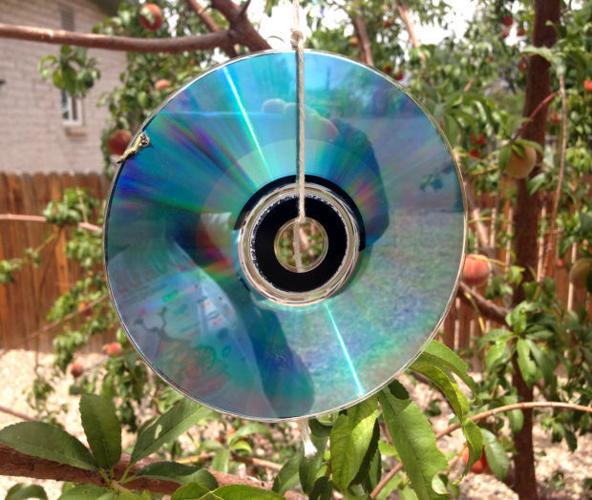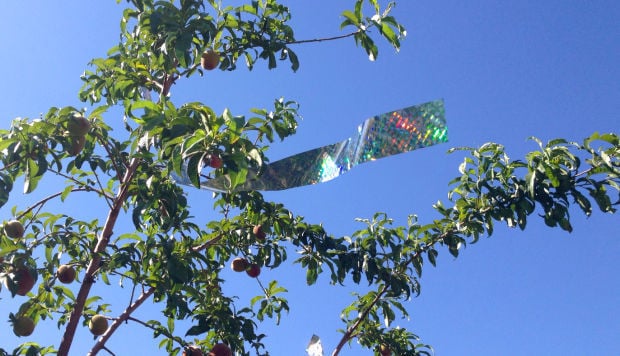Peaches — native, ripe peaches — are the absolute best fruit in the world, right?
In the summer as a kid, I’d grab an orchard peach and head outside, where the juice would dribble down my arm and drip onto the grass. (You’re welcome, Mom.)
So when I learned that peaches do quite well in Southern Arizona, I just had to plant some. This was 2011 and they were puny Desert Golds — maybe 3 feet tall.
They’ve grown since then — one is now twice as big as the other for some reason — and last summer was our first real harvest. Pat and I were sooo looking forward to that first crop. But we weren’t the only ones watching and waiting — the birds apparently were spreading the good news to all their feathered friends in the neighborhood. As the peaches began to ripen, we started losing a ton of them.
Now some gardeners think that's OK: Let the birds have their share.
But the problem is, they peck a hole in each peach and then move on to the next, leaving the fruit to rot. It's like letting your kid bite all the heads off the Gummi Bears.
And besides, who’s paying the water bills here?
So last May we put up some bird netting and tried to tie it closed underneath the lowest branches. But these were tall trees and short nets, so it wasn't easy and there were gaps.
Just in case, I checked the trees regularly for birds, which would inevitably get under the nets and have a little feast.
They didn't seem to mind being trapped — it's like being locked in at the free All-You-Can-Eat Buffet. Twice a day or so I'd chase them out.
One day, though, I found a lizard tangled in the net and hanging off the ground. The netting was wrapped tightly around his head and one leg. I couldn't even tell if he was alive at that point.
But I grabbed some scissors and set to work. Gently, carefully I snipped off the strings, knowing that one wrong cut would take off a toe — or worse. With each snip, he got a little heavier in my hand. At that point I could tell that he was still alive and breathing. His eyes cleared and he seemed to be looking right at me.
At the last snip, he zipped off my hand and skittered across the gravel to safety.
It felt wonderful to save his little life, but I knew that netting is not the best solution.
So what is?
The answer is nothing: None of it works.
At least according to Eric Clark, a horticulturist at Civano Nursery on the east side.
Clark nicely shot down all of my ideas. And with 25 years in the business, he should know.
Hanging CDs, reflective tape, plastic owls — none of it really works, he says. Birds are dumb but not that dumb.
“It’s a bit of a challenge because they get used to all of it.”
Jon Childers, who works for Mesquite Valley Growers at 8005 E. Speedway, was a little more optimistic.
His No. 1 method is bird netting for smaller trees, although he agrees it can catch critters. Mesquite Valley sells a variety of sizes with a three-quarter-inch mesh.
The No. 2 method, Childers says, is holographic bird scare tape.
In his grandmother’s day, people hung pie tins or strips of foil to the branches. Today, people use old CDs or DVDs — anything shiny to startle the birds.
Clark says netting can work but again, it can also trap and kill birds as well as lizards and snakes. And that’s traumatic — for you as well as the poor dead beastie.
Clark’s advice? Change your philosophy.
“Get used to sharing with the birds,” he says. It’s frustrating but if you grow enough fruit you won’t miss it.
And if you are still determined to protect your peaches, run out there right now and tie a paper bag to each fruit. Use thick rubber bands to attach them. And don’t use plastic bags — the fruit needs to breathe.
Also, he says, don’t let the squirrels see you putting the bags on, or they’ll figure out what’s up and muscle in on the action.
Wait — seriously, Eric??
Yes, he says — no joke. “Rock squirrels are a big problem.”
Get your dog out there to chase them away, if you have one.
And if all else fails, as soon the fruit starts ripening, just go pick ’em all.










